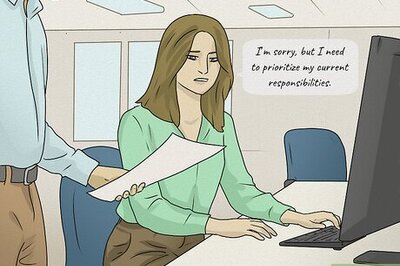
views
- Break up with your partner in person. This shows you respect them as a person, and it will help you both get closure.
- Be honest about your feelings but not cruel. You want your partner to be clear on why the breakup is happening, but not more hurt than necessary.
- After the break-up, take some time to grieve the relationship, focus on self-care, and spend time with loved ones.
How to End a Relationship Respectfully

End the relationship in person. No matter how much you're dreading it, it’s usually best to end the relationship face-to-face. This gives your significant other the respect they deserve and allows you both to get closure. It also helps prevent misunderstandings and miscommunications, which occur more frequently on digital forms of communication because they don’t allow you to read cues like body language or facial expression. It is acceptable, however, to end the relationship over the phone if you're in a long-distance relationship, and you know you won't see each other for a while. It’s also okay to end the relationship via phone or text if you're in a controlling or manipulative relationship. In fact, it’s preferable and safer to break up this way if your ex is prone to outbursts, violence, or manipulative behaviors.

Choose your time and place wisely. Be thoughtful when choosing a time and place for the break-up to avoid uncomfortable situations. Emotions may run high during the conversation, so it’s usually best to break-up somewhere private, instead of a busy public place. Consider the other person’s schedule as well—it’s not a good idea to break up with them right before they have a big test at school or an important presentation at work. Pick a time when they'll be in a calmer emotional state. Don't break up with your partner right after a stressful meeting at work, for example. Fridays can be a good choice since this gives your soon-to-be-ex the weekend to recover and process their emotions. Don't break up with your partner in your favorite restaurant, bar, or park. Pick a neutral location that has no special meaning for either of you.

Be firm about your decision to break up. Being wishy-washy or sugar-coating things to “let them down easy” only causes more pain in the end. Use clear, direct language and simply say that you don't want to be in the relationship anymore—doing otherwise creates confusion and leaves the door open for argument. Don’t imply that this is just a “break” or that you might get back together in the end. You may think that it'll ease the pain, but if you don't really mean it, their feelings will just get hurt again down the road. When you’re sure that someone isn’t the right person for you, it’s best to just say this directly, so you can both start to move on.

Be honest but not cruel. You don't want your partner to walk away feeling unsure about why the relationship was over, but you don't want them walking away knowing the top 20 things you don't like about them, either. Be truthful about why the relationship needs to end, but resist the impulse to list every little thing you don’t like about the other person, and avoid blaming them. You don't have to go into all the details and rehash old arguments, unless the person is genuinely confused about why you’re ending things. Don’t put the person down or add insult to injury. For example, instead of saying. "I don’t want to be with someone so insecure," say something like, "I think it may help you to work on your self-confidence." Try to boil it down to a main problem. For example : "We are not compatible enough in key areas," "I don't feel supported by you in my career path," or "I want children and you don't.”

Be prepared for however they may react. Being on the receiving end of a break-up can cause anger, shock, panic, sadness, and all kinds of other emotions. No matter how the other person reacts, try to remain calm. Put yourself in their shoes and approach the conversation with empathy. You can even show them some kindness by mentioning all the things you appreciate about them, or letting them know that you don’t regret your time together. Comfort them if they need it, but don't let their emotions sway you from your decision. Be compassionate, but also firm. If you're worried about leaving your ex alone, call a friend of theirs, explain what happened, and ask if they can come support your ex for a bit. If things get too out of control or the conversation becomes circular, step out for a bit to let them cool down, and tell them you can resume the conversation later.

Establish concrete boundaries for your future interactions. Decide what level of interaction you’re comfortable with, and convey this to your ex in a clear, direct way. Tell them, for example, that you’ll be disengaging on social media, that you won’t respond to phone calls or texts, or that unexpected visits are off-limits. Whatever boundaries you decide on, just make sure to communicate them firmly and enforce them as best you can. If you have mutual friends and want to avoid each other for a while, make a "joint custody" plan to see your friends without running into each other. If you both have a favorite coffee shop or go to the same gym every time, try to set a schedule that helps you avoid each other. Make a plan for returning each other’s belongings as soon as possible, so you don't have to keep seeing each other.
Getting Over the Break-Up

Don't try to be friends right away. Trying to be friends with your ex can prolong the agony of the breakup and make it harder for each of you to move on. It’s usually best to make a clean break, or at least to spend some time apart before trying to become friends. If either of you still has feelings for the other one, it’s too early to try to be friends. Take some more time to make sure you’ve both fully moved on. Don’t try to become friends with benefits—this can make things more complicated and hurt your chances of having a successful friendship in the future.

Take some time to grieve the relationship. Sure, you're the one who did the breaking up, but you’ll still likely need time to process your emotions. You might be sad that things didn’t work out, or that you're losing their companionship. You may also be dealing with feelings of guilt for ending things, even if you knew it was the right thing to do. Take some time to practice self-care, reflect, and heal. Try to use this time to think about what you’ve learned from the relationship. What things would you do differently next time? What are you looking for in a future romantic partner? Consider writing about your feelings in a journal. This cathartic practice can help you identify and understand your feelings better as you work on moving on. If you’re feeling sad, be kind to yourself. Do things that comfort you, like watching your favorite movie, ordering take out from your favorite restaurant, or even having a good cry.

Lean on loved ones for support. Spend time with trusted friends and family members as you heal. Break-ups can cause difficult emotions, and talking things out with your loved ones can help you process. Remember, you don’t have to go it alone! If you don’t feel comfortable opening up to friends or family, consider talking to a therapist to process your feelings.

Enjoy your post-relationship life. After some time has passed, you’ll start to heal and let go of any negative feelings. As you start to feel like yourself again, make an effort to prioritize and enjoy all the positive things in your life. Spend time with friends and family, pursue your hobbies, pick up some new interests, go after your professional goals—whatever your heart desires! Focusing on these things will remind you that a romantic relationship is just one aspect of your life, and that you have a lot of other amazing things going for you.
Why Break-Ups Happen

Break-ups happen for a number of reasons. You and your partner might have simply grown apart, or you may have realized that you weren’t fully compatible. On the other hand, toxic behaviors like infidelity, lying, or undue anger could have been contributing factors. Whatever the specific circumstances, it’s important to remember that break-ups are completely normal, and they happen to everyone. It may hurt right now, but you will feel better in time!

Signs it’s time to break up with your partner It’s important to be sure about your decision if you’re thinking about breaking up with your partner. Luckily, there are a few red flags that can help you recognize when ending a relationship is the best decision. Here are some warning signs to look out for: You’re constantly fighting, and you have more moments of tension and conflict than comfort and happiness Or, you’ve stopped communicating with each other and you don’t bother to address conflict anymore You can no longer imagine a future together, or you imagine two very different things for the future You no longer have loving, affectionate feelings for each other You can easily imagine being with someone else Trust has been severely damaged between the two of you, possibly due to infidelity




















Comments
0 comment